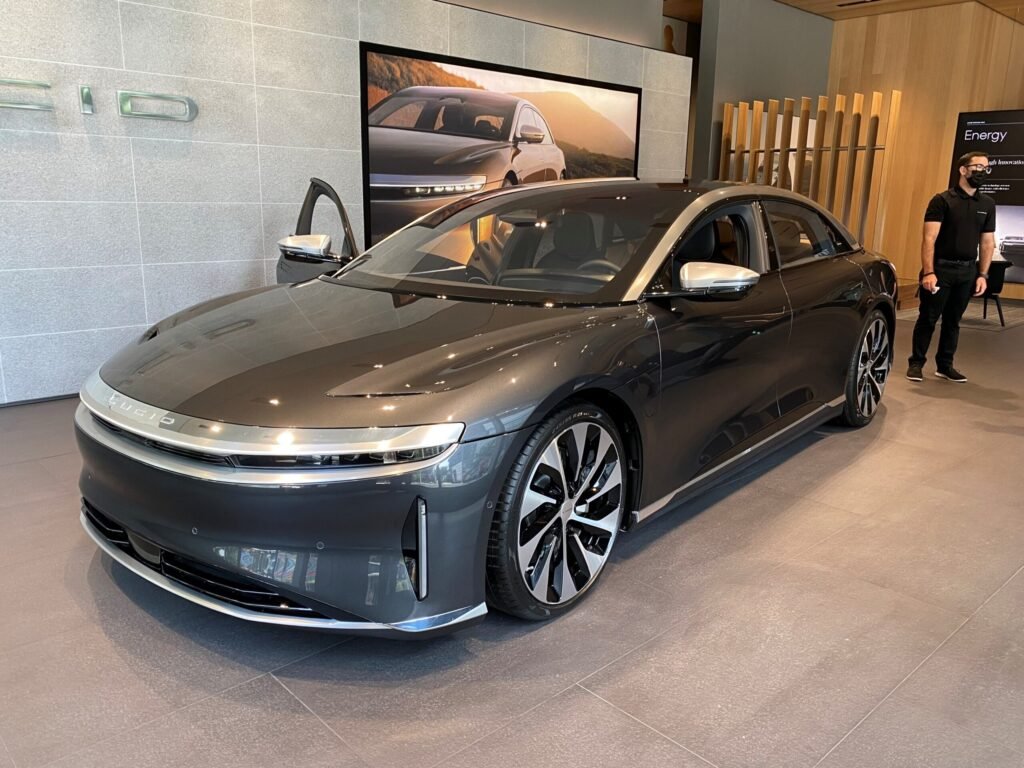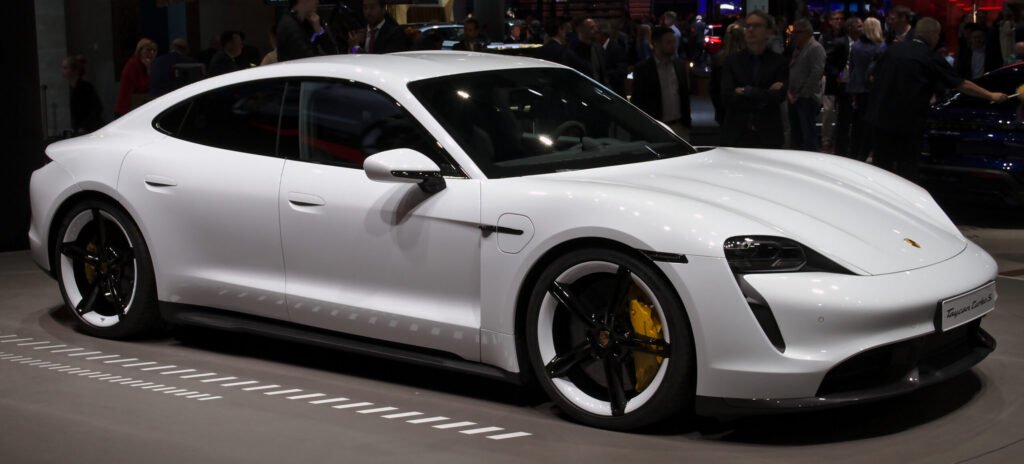What is the best electric car to buy? As you consider making the switch to an eco-friendly car, you’re likely overwhelmed by the numerous options available. This guide is designed to walk you through the process of choosing the right electric vehicle (EV) for your needs.

We’ll cover the basics of electric vehicles, top models for 2023, and key factors to consider. By the end of this article, you’ll be well-equipped to make an informed decision about your next EV.
Key Takeaways
- Understand the different types of electric vehicles available
- Learn about the benefits of driving an eco-friendly car
- Discover the top electric car models for 2023
- Key factors to consider when buying an electric vehicle
- How to choose the best EV for your lifestyle
Understanding Electric Car Basics
Before diving into the electric car market, it’s necessary to understand the underlying technology and types of electric vehicles. Electric cars are not just a single category; they come in various forms, each with its unique characteristics and advantages.
Types of Electric Vehicles Explained
Electric vehicles (EVs) are broadly classified into three main categories: Battery Electric Vehicles (BEVs), Plug-in Hybrids (PHEVs), and Hybrid Electric Vehicles (HEVs). Understanding these categories is crucial for determining which type suits your needs.
Battery Electric Vehicles (BEVs) vs. Plug-in Hybrids (PHEVs)
BEVs run solely on electric power, using batteries that are charged from an external power source. On the other hand, PHEVs combine electric and gasoline power, offering the flexibility to run on electric power alone for a certain distance before switching to hybrid mode.
Hybrid Electric Vehicles (HEVs)
HEVs use electric power to assist the gasoline engine, improving fuel efficiency and reducing emissions. Unlike PHEVs, HEVs cannot be charged from an external power source; their batteries are charged through regenerative braking and the engine.
Key Components and Technology
The performance and efficiency of electric vehicles depend on several key components, including battery systems, electric motors, and drivetrains.
Battery Systems and Range
The battery system is a critical component of an electric vehicle, determining its range and overall performance. Advances in battery technology have significantly improved the range of modern EVs.
Electric Motors and Drivetrains
Electric motors convert electrical energy into mechanical energy, propelling the vehicle. The drivetrain transmits this energy to the wheels, with some EVs featuring advanced drivetrain technologies for improved efficiency and performance.
| Type of EV | Power Source | Charging Capability |
|---|---|---|
| BEVs | Electric | Yes, from external source |
| PHEVs | Electric + Gasoline | Yes, from external source |
| HEVs | Gasoline + Electric Assist | No, charged through regenerative braking and engine |
What is the Best Electric Car to Buy? Top Options for 2023
As you navigate the electric vehicle market in 2023, finding the best electric car can be a daunting task. With numerous models available, it’s essential to explore the top options categorized into premium, mid-range, and budget-friendly segments.
Premium Electric Car Models
Premium electric cars offer advanced features, superior performance, and luxurious interiors. Two notable models are:
Tesla Model S and Model X

The Tesla Model S is renowned for its impressive range and acceleration, while the Model X offers a spacious interior and unique falcon-wing doors. Both models embody Tesla’s commitment to innovation and sustainability.
Lucid Air and Porsche Taycan

The Lucid Air boasts an impressive range of up to 520 miles, making it one of the longest-range EVs available. The Porsche Taycan combines luxury with exceptional performance, offering a driving experience that’s hard to match.

Mid-Range Electric Vehicle Options
Mid-range electric vehicles offer a balance between affordability and features. Notable models include:
Tesla Model 3 and Model Y
The Tesla Model 3 is a popular choice due to its affordability and impressive range. The Model Y offers a similar driving experience with a larger, more versatile interior.
Ford Mustang Mach-E and Hyundai Ioniq 5
The Ford Mustang Mach-E combines the iconic Mustang name with electric performance, offering a compelling driving experience. The Hyundai Ioniq 5 features a modern design and advanced technology, making it a strong contender in the mid-range segment.
Budget-Friendly Electric Cars
For those on a tighter budget, there are still several attractive electric car options:
Chevrolet Bolt EV and Nissan Leaf
The Chevrolet Bolt EV offers an affordable entry point into the EV market with a respectable range. The Nissan Leaf is another budget-friendly option with a long history of reliability.
Mini Cooper SE and Hyundai Kona Electric
The Mini Cooper SE brings the iconic Mini design to the electric age, offering a fun and stylish driving experience. The Hyundai Kona Electric provides a compact, feature-rich EV option for urban drivers.
Essential Factors to Consider When Buying an Electric Car
When considering the purchase of an electric car, several key factors come into play to ensure you make the right choice. As you navigate the process, understanding these elements will help you make an informed decision that aligns with your needs and preferences.
Range and Battery Capacity
The range and battery capacity of an electric car are crucial considerations. You need to assess your daily driving needs to determine the required range.
Daily Driving Needs Assessment
Evaluate your typical daily driving habits to understand how much range you need. Consider factors like commute distance, frequent trips, and whether you often drive in heavy traffic.
Battery Degradation Factors
Battery degradation can affect the overall range of your electric car over time. Factors like charging habits, climate, and driving style can influence battery health.

Charging Infrastructure and Options
Understanding the charging infrastructure and available options is vital for electric car owners. You need to know how to charge your car conveniently and efficiently.
Home Charging Solutions
Installing a home charging station can provide the convenience of charging your car overnight. Consider the cost and installation requirements.
Public Charging Networks
Public charging networks are expanding rapidly. Research the availability and accessibility of public charging points along your frequent routes.
Performance and Driving Experience
The performance and driving experience of an electric car can significantly impact your satisfaction. Consider factors like acceleration, handling, and unique features.
Acceleration and Handling
Electric cars are known for their instant torque and smooth acceleration. Test drive different models to experience their handling and responsiveness.
One-Pedal Driving and Regenerative Braking
Many electric cars offer one-pedal driving and regenerative braking, which can enhance the driving experience and improve efficiency.
Cost Considerations and Incentives
Finally, consider the cost implications of buying an electric car, including incentives that can reduce the financial burden.
Federal Tax Credits and State Rebates
Research available federal tax credits and state rebates that can help offset the purchase price of your electric car.
Total Cost of Ownership Analysis
Conduct a total cost of ownership analysis, including factors like fuel savings, lower maintenance costs, and potential incentives.
Conclusion: Making Your Electric Car Decision
You now have a comprehensive understanding of the electric car landscape, including the different types of electric vehicles and top models for 2023. As you weigh your options, consider your specific needs and preferences to find the best electric car for you.
With this electric car buying guide, you’re well-equipped to navigate the world of electric vehicles (EVs) and enjoy the many benefits that come with EV ownership, from reduced environmental impact to lower operating costs.
Whether you’re looking for a premium EV or a budget-friendly option, the key is to research and test drive different models, considering factors like range, charging infrastructure, and performance. By doing so, you’ll be able to make an informed decision and find the perfect electric car that suits your lifestyle.
FAQ
What is the best electric car to buy?
The best electric car for you depends on your specific needs, budget, and preferences. Top models for 2023 include Tesla Model S, Lucid Air, and Porsche Taycan for premium options, Tesla Model 3 and Ford Mustang Mach-E for mid-range, and Chevrolet Bolt EV and Nissan Leaf for budget-friendly choices.
What are the different types of electric vehicles?
There are three main types: Battery Electric Vehicles (BEVs) that run solely on electric power, Plug-in Hybrids (PHEVs) that combine electric and gasoline power, and Hybrid Electric Vehicles (HEVs) that use electric power to assist the gasoline engine.
How do I assess my daily driving needs for an electric car?
To assess your daily driving needs, consider your typical daily commute, frequent driving routes, and the number of passengers you usually transport. This will help you determine the required range and battery capacity for your electric vehicle.
What are the benefits of electric vehicles?
Electric vehicles offer several benefits, including reduced environmental impact, lower operating costs, and a smoother, quieter driving experience. They also qualify for federal tax credits and state rebates, which can help offset the purchase price.
How do I charge an electric car at home?
You can charge an electric car at home using a Level 1 (120V) or Level 2 (240V) charger. Level 2 chargers are faster and more convenient, but require a dedicated 240V charging station installation.
What is the total cost of ownership for an electric car?
The total cost of ownership for an electric car includes the purchase price, financing costs, fuel (electricity), maintenance, and insurance. While the purchase price may be higher, electric cars often have lower operating costs, which can help offset the initial expense.
Are there any incentives for buying an electric car?
Yes, there are federal tax credits and state rebates available for buying an electric car. These incentives can help reduce the purchase price and make electric vehicles more affordable.




